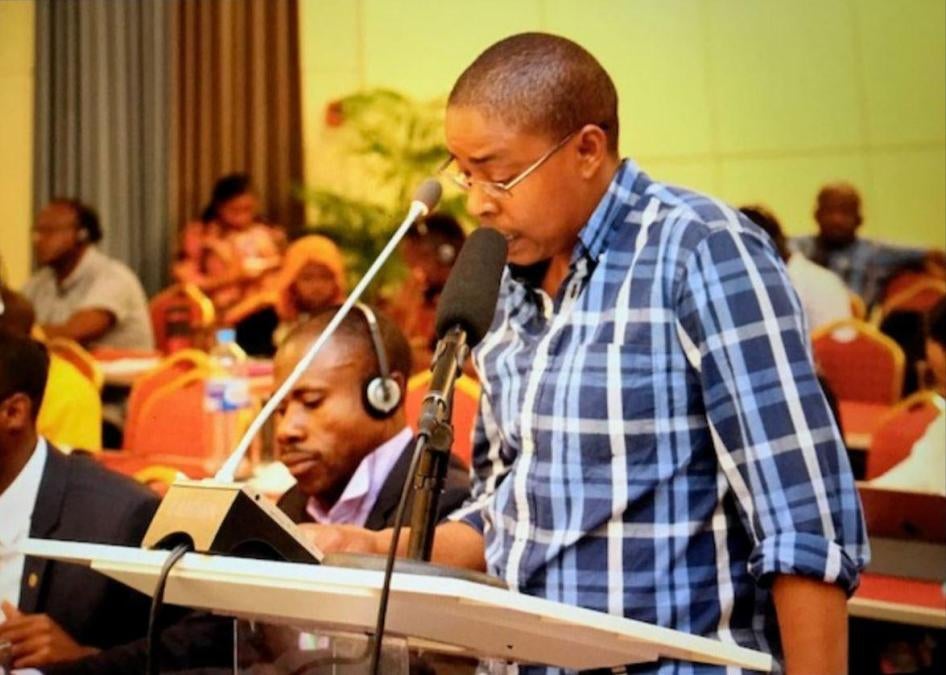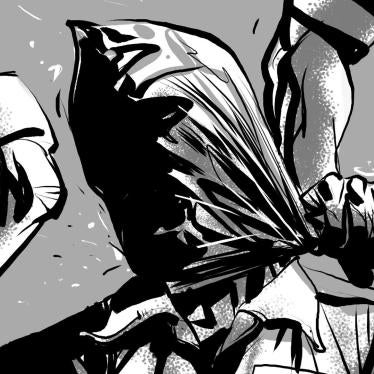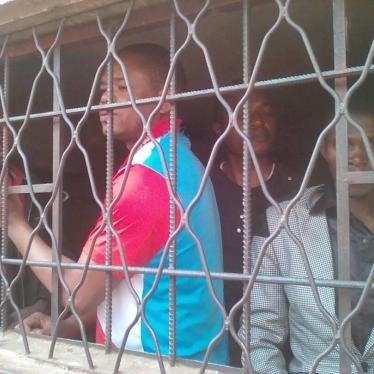Madam Chairperson, Commissioners and Heads of Government Delegations:
Human Rights Watch welcomes this opportunity to address the African Commission under this Agenda Item.
Madam Chairperson, the general human rights situation in much of Africa remains worrying, but for the purposes of this statement, Human Rights Watch will focus on urgent human rights concerns in Rwanda and the Democratic Republic of Congo.
Rwanda
In the wake of the 2017 presidential elections, which saw the incumbent President Paul Kagame win a reported 98.79 percent of the vote, the conditions do not exist for independent political voices and activism. In both the lead-up to the election and during the voting, we noted many violations of the right to freedom of expression, association, and assembly across the country. Political opponents who dared to challenge the status quo are now in jail and journalists have been threatened.
Over at least the last 12 years, Rwandan authorities rounded up poor people off the streets, arbitrarily detaining them in so-called “transit centers” (also called “rehabilitation centers”) across the country, in violation of Rwanda law. The conditions in these centers are often inhuman – many detainees were beaten – and reflect a government perception of certain groups of people as sources of social nuisance or petty criminals, rather than victims or vulnerable people.
Scores of people suspected of collaborating with “enemies” of the Rwandan government were detained arbitrarily and tortured in military detention centers by Rwandan army soldiers and intelligence officers from 2010 to 2017. Some of these people were held in unknown locations, including incommunicado, for prolonged periods and in inhuman conditions.
In October, the Subcommittee on the Prevention of Torture, a monitoring body of the Optional Protocol to the Convention against Torture, ratified by Rwanda in 2015, conducted a state visit. They had to suspend their visit and leave sooner than planned, citing obstruction from the Rwandan government and fear of reprisals against interviewees. This was only the third time in 10 years that the Subcommittee has suspended a visit.
State security forces in Rwanda summarily killed at least 37 suspected petty offenders and forcibly disappeared four others in Rwanda’s Western Province between April 2016 and March 2017. Most victims were accused of stealing items such as bananas, a cow, or a motorcycle. Others were suspected of smuggling marijuana, illegally crossing the border from the Democratic Republic of Congo, or of using illegal fishing nets. On this issue and others, rather than engage with us, the government of Rwanda has followed a common pattern for how it deals with criticism. Government officials threatened, intimidated, or even detained family members of victims who dared to denounce the killings of their loved ones. The government has also attacked Human Rights Watch and sought to discredit its work, leading to a string of disparaging and unfounded comments against our staff from government officials and parliamentarians.
- In accordance with the African Charter on Human and Peoples’ Rights, we urge the Commission to conduct an immediate investigation into cases of extrajudicial executions, arbitrary detention and torture.
- We further respectfully urge the Commission to maintain a strong demand and pressure for accountability for these human rights violations and others.
Democratic Republic of Congo
Political violence and government repression intensified in 2017, as President Joseph Kabila held onto power beyond his constitutionally mandated two-term limit, which ended on December 19, 2016. As authorities deliberately stalled plans to organize elections, government officials and security forces systematically sought to silence, repress, and intimidate the political opposition, human rights and pro-democracy activists, journalists, and peaceful protesters. Meanwhile, government security forces and numerous armed groups committed vicious attacks on civilians across the country, with devastating humanitarian consequences. More people were internally displaced in the Democratic Republic of Congo in 2017 than in any other country in Africa, and more schools were attacked in Congo in 2017 than in any other country in the world.
Security forces killed at least 171 people during protests across the country in 2015 and 2016 against Kabila’s attempts to extend his presidency. Security forces also killed at least 90 people as part of a crackdown against members of the Bundu dia Kongo (BDK) politico-religious sect in Kinshasa and Kongo Central provinces in January, February, and August 2017. Some of the BDK members also used violence, killing several police officers.
Throughout 2017, government officials and security forces repeatedly and systematically banned opposition demonstrations, shut media outlets, and prevented opposition leaders from moving freely. They jailed hundreds of opposition leaders and supporters, journalists, and human rights and pro-democracy activists. Many were held in secret detention facilities, without charge or access to family or lawyers. Others have been tried on trumped-up charges.
Authorities prevented international and Congolese journalists from doing their work, including by arresting them, denying access, or confiscating their equipment and deleting footage. Nearly 40 journalists were detained in 2017. The government has shut down Congolese media outlets and periodically curtailed access to social media. Authorities lifted a nine-month block on Radio France Internationale (RFI)’s signal in Kinshasa in August, but they refused to renew the work permit for both the RFI and Reuters international correspondents in Congo.
Since August 2016, violence involving Congolese security forces, government-backed militias, and local armed groups left up to 5,000 people dead in the country’s southern Kasai region. About 1.4 million people have been displaced from their homes, including 30,000 refugees who fled to Angola. Nearly 90 mass graves have been discovered in the region, the majority of which are believed to contain the bodies of civilians and militants killed by government security forces using excessive force against alleged militia members or sympathizers.
- We urge the Commission to publicly call for a peaceful, democratic transition in Congo to help prevent further violence, repression, and instability, which could have potentially dire consequences across the sub-region.
- We respectfully call on the Commission to press Congolese authorities to open political space, including by releasing political prisoners and allowing peaceful protests, and to fully cooperate with ongoing international investigations into abuses in the Kasai region.
- Finally, we urge the Commission to conduct an independent investigation into the repression against peaceful protesters and arbitrary, politically motivated arrests of human rights and pro-democracy activists and political opposition supporters in Congo, and to help ensure that perpetrators of such violations are appropriately brought to justice
Thank you.









